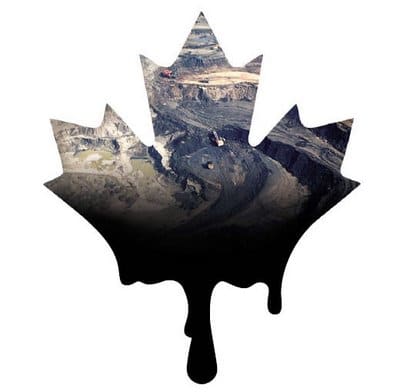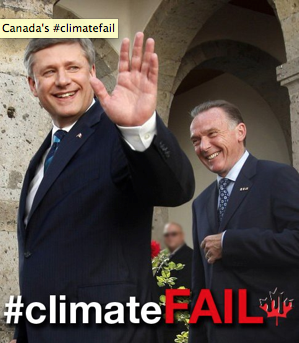Canada is pulling out of the Kyoto Protocol, the cornerstone of international climate negotiations, in the wake of the failed COP17 climate talks in Durban. Canadian Environment Minister Peter Kent announced Canada’s bail-out of Kyoto as he returned from Durban.
The Kyoto Protocol was ratified by Canada in 2002, when the agreement became legally binding. Canada’s decision to turn its back on its international obligations confirms yet again that Stephen Harper and his carbon cronies are securing a hellish future for generations to come. Canada’s ‘leaders’ are brashly choosing pollution-based profiteering over public health and cooking the climate to make a killing in the tar sands.
BBC reports:
Peter Kent said the protocol “does not represent a way forward for Canada” and would have forced it to take “radical and irresponsible choices”.
The move, which is legal and was expected, makes it the first nation to pull out of the global treaty. …
“Kyoto, for Canada, is in the past, and as such we are invoking our legal right to withdraw from Kyoto,” Mr Kent said in Toronto.
CBC has details on Kent’s timing, as well as a news poll showing 62% disapproval of the decision (as of 3pm PST) on CBC‘s Inside Politics Blog:
Kent returned to Ottawa from Durban Monday afternoon and made the announcement about two hours after landing.
He said he waited to formally pull out of the Kyoto Protocol because he’d promised a top UN official in Durban not to distract from the talks.
Greenpeace Canada climate and energy campaigner, Mike Hudema, reacts:
“The Harper government has imposed a death sentence on many of the world’s most vulnerable populations by pulling out of Kyoto. The decision to leave Kyoto behind destabilizes the promise of action on the climate crisis. This is a further signal that the Harper government is more concerned about protecting polluters than people.”
DeSmog contributor Graham Readfearn wrote in ABC‘s The Drum yesterday on the implications of the failed Durban talks, and what we can expect in the future. From his article, “Locking in calamity: Durban agrees to dither”:
The United Nation’s Environment Program’s recent update to its Bridging the Emissions Gap report shows the result of Durban’s non-decision.
To give the planet (that’s us, folks) a “likely” chance of limiting global warming below 2C, global human-caused emissions need to peak at about 44 Gt of greenhouse gases by 2020.
But those UN analysts and scientists for Climate Analytics, say current pledges on emissions will instead see the world emitting more like 55 Gt by then.
This looks like a commitment to warm the planet by about 3C by the end of the century. BBC science correspondent Richard Black says some analysts are projecting that current pledges will in fact deliver 4C of global warming. Yet the science suggests that a world warmed by 2C, considered the threshold for “dangerous” climate change, is still a radically changed place.
Among some of the probable impacts in a 2C+ world, are widespread coral bleaching, sea level rises of a metre, more extended droughts, decline of crops, dieback of the Amazon rainforest, sharp rises in species extinction rates, more frequent extreme weather events such as floods and heatwaves and a broad array of human health impacts.
The news of Canada’s pull-out isn’t sitting well, even as far away as Taiwan, where Next Media Animation put out this scathing video reacting to the news (2nd one is English version):
Perhaps South Park sums it up best (substitute climate disaster for foul-mouthed kids and it is a fitting jingle today):
Subscribe to our newsletter
Stay up to date with DeSmog news and alerts







